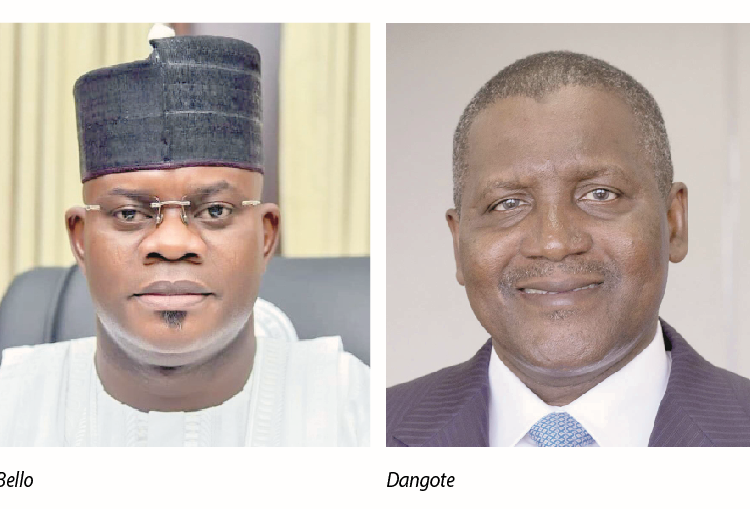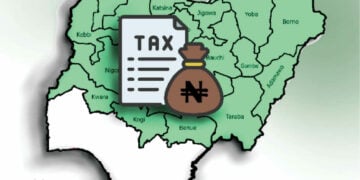President Muhammadu Buhari recently met with the Bayelsa State governor, Duoye Diri, at the State House, Abuja. The meeting was at the instance of the governor who was troubled over the ownership of an oil block earlier allocated to Bayelsa but later revoked. To show the importance of the meeting, the governor was accompanied by his predecessor, Senator Seriake Dickson; His Royal Majesty, King Alfred Diete-Spiff and the Chairman of the State’s Council of Traditional Rulers, His Royal Majesty, King Bubaraye Dakolo. One of his key demands was the restoration of the Oil Mining Licence, “OML 46” to Bayelsa State, which he said was unjustly revoked and awarded to a private company. OML 46, said the Governor is “emotional” to Bayelsans, whom he said, possessed the technical and financial capacity to manage the oil well.
In Kogi State, his counterpart, Governor Yahaya Bello faced similar challenge over the ownership of Obajana Cement Company Plc that is now under the control of Dangote Cement Company Limited. The issue came to the fore when the governor in his quest for good governance and accountability, set up a seven man Judicial Commission of Inquiry pursuant to Section 2 of the Commission of Inquiry Law Cap. 25 Laws of Northern Nigeria (as applicable in Kogi State) vide Kogi State Legal Notice No. 2 of 2016 and all powers enabling thereto, to probe, investigate, recover misappropriated public funds, lost or diverted Government properties, failed contracts and existence of ghost workers in Kogi State. The probe covered 29th May, 2003 to 27th January, 2016.
The Commission’s report showed that the state was shortchanged over the ownership of Obajana Cement. The Kogi State government sought audience with the management of Dangote Cement Company Limited but it met a brick wall! According to Kogi State sources, “…Dangote failed, refused and neglected to supply the Commission with the certified true copies of Corporate Affairs Commission documents to evidence the history and its acquisition, if any. vii) that it was not clear whether the signatories on behalf of the State carried the entire State machinery along, as the transaction appeared lopsided and denied the State of commensurate earnings in the transaction.”
This notwithstanding Governor Bello has expressed willingness to meet the Dangote Group at the negotiation table. The Kogi State Government said that it will be ready to enter into negotiations once Dangote Group is ready to admit that Obajana cement plant does not belong to it. Governor Yahaya Bello gave this indication while presenting documents to back the state’s claim to the ownership of the plant. The documents are from the report of the Specialised Technical Committee on the Evaluation of the Legality of the Alleged Acquisition of Obajana Cement Company Plc by Dangote Cement Company Limited. The detailed report, which was submitted to Governor Yahaya Bello last month, was presented to the public by the Secretary to the State Government, Dr. (Mrs) Folashade Ayoade.
According to her, the claimed transfer of Obajana to Dangote Industries Limited was “invalid, null and void.” Ayoade said in the report that three certificates of occupancy for Obajana Cement Company Plc, which was solely owned by the Kogi State Government at the time, were used to obtain a loan of N63billion by Dangote. She said the committee, in view of its findings, had recommended that Kogi State take steps to recover the Obajana Cement Company from the Dangote Group.
The Committee, chaired by the Secretary to the State Government, also recommended that, “Kogi State Government should take steps to recover all accrued dividends from profits made over the years, including accrued interest on the same.
“Kogi State Government should take steps to cancel the existing seven Certificates of Occupancy in the name of Dangote Cement Company.”
“Agreement between Kogi State Government of Nigeria and Dangote Industries Limited, dated 30th July 2002 and supplemental agreement dated 14th February 2003, as contained in Exhibit 71 of the Judicial Commission of Inquiry Report, purporting the transfer of Obajana Cement Company Plc to Dangote Industries Limited, are all invalid, null and void.
“There is no evidence of consideration paid by Dangote Industries Limited to Kogi State Government from the alleged transfer of Obajana Cement Company Plc and no dividend was paid to the state from the profits realised from the inception of Dangote Cement Company Plc to date.”
The Speaker of the Kogi State House of Assembly, Matthew Kolawole, has also said the acquisition of the Obajana Cement Company by Dangote was without the resolution of the House of Assembly, which he noted rendered the process null and void. “It is clear that you cannot sell a state government property of any form without the resolution of the Kogi State House of Assembly. “All the transfer process of the share capital to Dangote from Obajana by the previous administration was without any law backing it by the state House of Assembly,” Kolawole stated.
Governor Yahaya Bello said the decision to seal the plant came on the back of several petitions by members of the local community who felt marginalised by the company. The governor, however, said that the state was open to discussions once Dangote Company Plc was ready to come to dialogue.
“We received several petitions from the general public over this particular subject matter. In the past five to six years, all efforts to sit with the proprietors of the Dangote Conglomerate failed,” he reportedly said.
As I was writing this column, I saw news flash that the Management of Dangote Cement Plc. firmly declared that the Obajana Cement plant in Kogi State is owned 100 per cent by it and that the alleged invasion of the plant by armed vigilantes “on the orders of the state government” was illegal. And in a swift reaction, the Kogi State Government said the state “has all the relevant documents to prove that the purported acquisition of Obajana by Dangote is null and void.”
Kogi Assembly Inferno: Probe Begins, Dangote Denies Involvement
Dangote Cement Plc, in the statement signed by its Group Managing Director (GMD) Michel Puchercos and titled, “Illegal Shutdown of Dangote Cement, Obajana Plant”, declared the firm’s full ownership of the Obajana plant, while berating the alleged attack on the plant. Puchercos said: “The Management of Dangote Cement Plc. wishes to inform members of the public, especially its customers and other stakeholders of the recent invasion of its Obajana Cement Plant, Kogi State by armed vigilantes on the orders of the state government. “The vigilantes, led by some officials of the State government were apparently acting on a resolution of the Kogi State House of Assembly on controversial tax claims; claims that the state governor had also contradicted when he said the shutdown was due to an alleged invalid acquisition of the company by Dangote Industries Limited.”
Like Governor Diri of Bayelsa State, Governor Yahaya Bello is within his right to fight for the interest of his people which was why he was elected in the first place. His conciliatory stance of readiness for negotiation on the various issues is commendable. It is noteworthy that when Diri took his case to President Muhammadu Buhari, the president promised to restore the revoked oil block. Of course that would be much easier to do by the president who acted not only as president but also minister of petroleum resources and was directly involved in the revocation of the oil licence based on the advice he was given by Nigeria Upstream Petroleum Resources Commission (NUPRC)!
The president’s intervention is also necessary in this ownership tussle between the Kogi State Government and Dangote Cement Plc. I am sure that the President can bring the Kogi State government and president of Dangote Group of Companies to the negotiation table in the interest of all the parties concerned.
Investment in any state must benefit the people of the state and also benefit their private sector partners. That is how economies grow and provide developmental opportunities for the people all over the world.
That is what is called shared prosperity that creates room for economic development. Many students of development studies have heard about the resource curse theory. The resource curse, also known as the paradox of plenty or the poverty paradox, is the phenomenon of countries with an abundance of natural resources (such as fossil fuels and certain minerals) having less economic growth, less democracy, or worse development outcomes than countries with fewer natural resources. There are many theories and much academic debate about the reasons for, and exceptions to, these adverse outcomes. Most experts believe the resource curse is not universal or inevitable, but affects certain types of countries or regions under certain conditions. What many are not aware is that resource curse becomes inevitable when the leadership that oversees the resources turn a blind eye to the multinationals’ monopolization of its resource exploration and exploitations. That is why when a state government or country has a leadership that begins to seek the best interest of its people, it deserves commendation. Whatever becomes the outcome of this tussle, it should be a win-win situation for the citizens of Kogi State who own the resources in the ground and the Dangote Group. However, this column believes in people before profit!
MAY NIGERIA REBOUND





